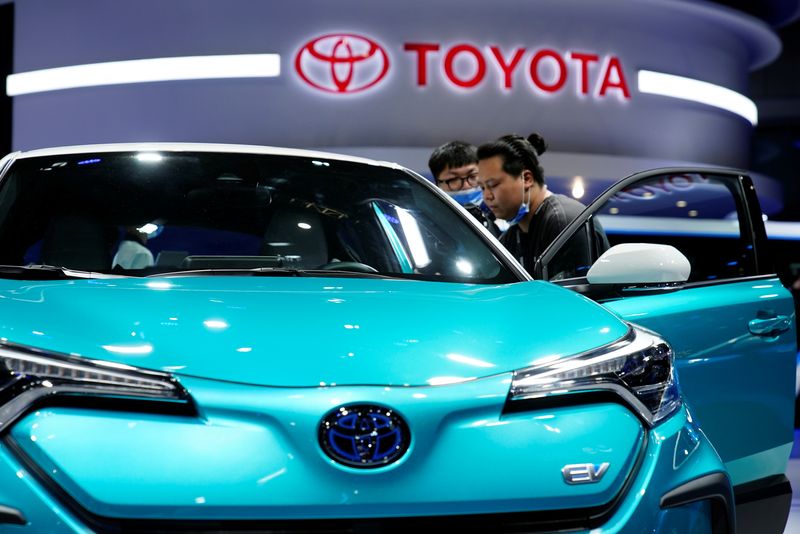By Maki Shiraki
TOKYO (Reuters) - Toyota aims to make at least 2.5 million vehicles a year in China by 2030, three people said, an overhaul that will see it bring its Chinese sales and production operations closer together and allow local executives a freer hand in development.
The plan, which has not been previously reported, represents a strategic pivot by the world's top selling automaker in the world's largest car market, underlining its ambition to claw back business lost to BYD (SZ:002594) and other local players in recent years.
Toyota's strategy is in contrast to that of other global automakers, including Japanese ones, that are either scaling back or pulling out of China.
It aims to boost production to as much as 3 million vehicles a year by the end of the decade, two of the people said. However, it has stopped short of establishing a formal target, the three people said. All of the people declined to be identified because the matter has not been made public.
The bigger number represents a 63% increase on the record 1.84 million vehicles it produced in China in 2022. Last year it produced 1.75 million vehicles there.
Toyota has informed some suppliers of the intended ramp-up, in the hope of reassuring parts makers of its commitment to China and thereby securing its supply chain, the people said.
In response to questions from Reuters, Toyota said in a statement: "With the intense competition in the Chinese market, we are constantly considering various initiatives". It said it would continue to work on making "ever-better cars" for the Chinese market.
The Japanese automaker aims to bring the sales and production operations of its two Chinese joint ventures closer together, to improve efficiency, two of the people said.
It also intends to transfer as much of the development responsibility as possible to China-based staff who have a better grasp of local market preferences, particularly around electrified and connected car technology, two of the people said.
'TOO LATE'
The moves signal a growing awareness within Toyota that it needs to rely more on local staff to take charge and speed up product development in China, one of the people said, adding that otherwise "it will be too late".
Legacy automakers, Toyota included, have been outmaneuvered in China as domestic EV makers rapidly roll out affordable, battery-powered cars with advanced technology.
Last year Toyota announced plans to deepen cooperation among its R&D centre in Jiangsu province and its two local joint ventures.
One problem, representative of Toyota's broader woes, is that vehicles developed independently by joint venture partners are selling better than those produced with Toyota.
For instance, FAW Group's Hongqi brand and GAC Group's Aion EV both outsell respective models from FAW Toyota Motor (NYSE:TM) and GAC Toyota Motor. Toyota now intends to better incorporate the know-how of local partners in its cars.
Currently, the same vehicle is produced at each of the two joint ventures and sold with a different design and company name - so-called "twinned vehicles". Going forward, production for each car will be consolidated at one of the joint ventures, two of the people said.
The models will be made available at dealerships of both JVs.
As Japanese automakers have been hit, so have Japanese parts suppliers with operations in China.

Toyota announced at its earnings on Wednesday that operating income in China fell during the first half of the financial year mainly due to higher marketing costs brought about by heavy price competition against Chinese brands.
Amid that competition, Mitsubishi Motors Corp (OTC:MMTOF) has withdrawn from China, while Honda (NYSE:HMC) Motor and Nissan (OTC:NSANY) Motor have decided to reduce local production capacity.